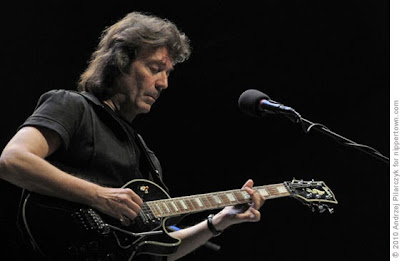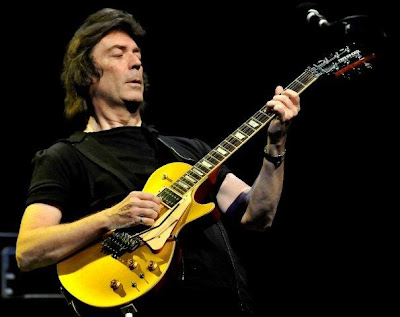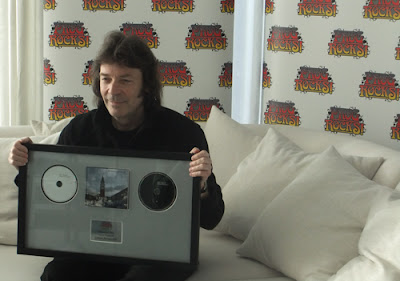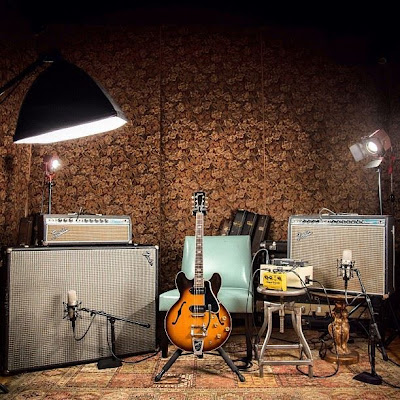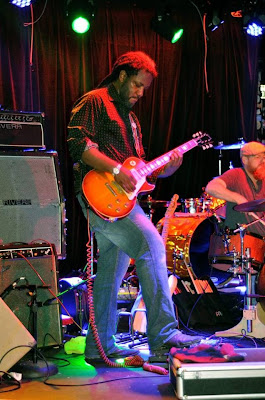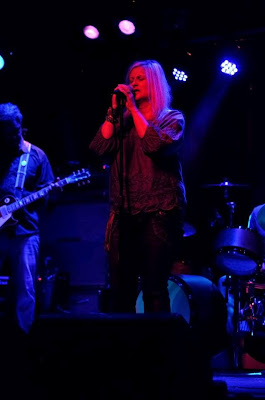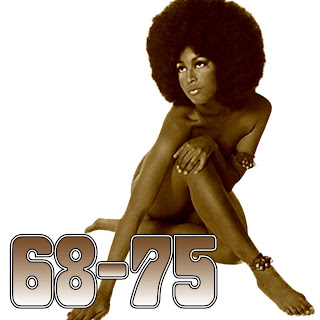"I know progressive rock has had its critics, but I can't bring myself to be critical of the music that was a shot in the dark from a bunch of young guys." ~ Steve Hackett on GenesisSteve Hackett was named Best Guitarist in 2012 by Prog Magazine, and his latest album, Genisis Revisited II garnered the award for Best Album. Since then, he has toured to packed houses across the UK and Europe, and he will be bringing the production through the US and Canada starting late in September.
Genesis Revisited II has been a phenomenal success - while generally I've not been a fan of artists re-recording their past glories, that all changed with this release. Hackett chose not to attempt what many have done - re-recording old hits to circumvent old record companies and contracts in order to generate new profits - he actually approached the project for all the right reasons, enhancing old arrangements with orchestral accompaniment unaffordable at the time of the original recordings, improving some personal performances via his own musical growth and maturity, and even including many musicians who were inspired and influenced by these songs over the years. Success born of right intent, right effort, and authenticity.
I had the privilege and opportunity to talk with Steve last week, a busy week in which he had the unfortunate duty of returning home from holiday to write a eulogy for his recently deceased father:
Steve Hackett: "I was in Italy earlier today, and this evening I'm back in England! So, I've been traveling as is my way, and I was recently in Greece just a few days ago, and now I'm talking to you in California - the global village is in full working order!"
I offered my condolences for his father's passing, and asked about the influence of his father - not just as a musician, but as a man:
Steve Hackett: "Thank you. That happened just at the beginning of my holiday. It's one of those things, and there's going to be a funeral two days from today for him. I'm just writing an obituary, in a way, something I can read at the funeral.
"He was the guy that brought me to music!
"He played a number of instruments, not professionally, but first of all he passed on the harmonica to me - mouth organ, and then it was the guitar. The first guitar chords I learned were from my dad, from a guitar he'd brought back from Canada. He had lived in Canada for a couple of years.
"He brought back a guitar, and when I was twelve, I was finally big enough to seat the thing on my knee and try to get sounds out of it.
"So yeah, he was very important to me and my brother, who was also a musician. He suffered both our early efforts at making music.
"I was just writing this - my dad was a powerhouse - he produced thousands of paintings. A reclusive man, but he was a friend to so many in his quiet way. You'd always find out by the back door that my dad had done something for this guy, and that woman, fixed the lights for somebody, and done the shelving for someone else, all that kind of stuff.
"yeah, one of those quiet heroes. He'll be sadly missed. He hadn't been well for many years. In his time, he was an extraordinary character."
Choosing to stay with this familial thread of thought, I asked Steve about his relationship with his wife, Jo. His wife is not just an author in her own right, she also writes lyrics and music with her husband, is very instrumental in running the family business, and like Hackett is a knowledgable world traveler:
Steve Hackett: "Jo and I were married a couple of years ago, so we became an official couple at that point, though we've known each other much longer than that.
"Over the course of twenty years, and we really share everything. It's quite an extraordinary thing! We just came back from holiday in Greece - she's a great Grecophile, and historian. She's written the occasional history book!
"She's so very well informed about a number of things - I'm a pupil here, if you know what I mean, I've got everything to learn!
"She and I share so many things, and I think that we took so long to get together as an official couple, having gone through my divorce, we're kind of making up for lost time. We travel to as many places as possible and do as many things as we possibly can, work with as many people as possible, write as many songs together as possible, and it's a partnership in every sense of the word.
"She loves to travel, and travel is important to feed the creative spirit. I don't think there's anyplace she's been with me that she's been bored. There is always something about everywhere - she's a regular Pollyanna in that sense of the word. As long as we're together, we always feel like we are at home. Wherever we are, whether we're in the air, the car, everywhere becomes a capitol city - it's 'In the Moment Central!'
"I found I couldn't be without her, and it's been very long and it's still blossoming, I have to say!"
Moving on to matters musical I asked about the genesis of Genesis Revisited II:
Steve Hackett: "It always felt current to me. I know that progressive rock has had its critics, but I can't bring myself to be critical of the music that was a shot in the dark from a bunch of young guys.
"I started with Genesis just over 40 years ago, 41 years ago, oh no - 42 years ago!
"We're talking, I met them in 1970, joined in 1971, and I think the band was pulling in several directions at once, but we managed to contain it into something cohesive. The early albums weren't huge successes, but there were giant strides to be made in an industry that was still growing itself.
"Luckily, America was very open to all things English.
"It's difficult for me to compress into a few sentences, but I do love the music. I loved it then, and I love it now.
"I think the politics sometimes got in the way. In the main, when we were completely open to each other, I think we came up with some extraordinary stuff. It still holds up today, and this stuff is constantly being reinterpreted by younger acts, and my homage to the early years has brought in so many who were inspired and influenced by it.
"Genesis Revisited - it's not really a band, it's a cross between a choir and an orchestra for the nearly forty people involved in putting this together, adding their bits, and I felt very proud to do it.
"It was great to go back and do it with new people, and add orchestra in some places. Just generally to help it breathe a bit more.
"I've had a lot of time to think about this! In those days, when we used to have to rush the recording process, we were in and out of the studio - between gigs. I think the standards - obviously since then, the goal posts have shifted within the industry."
Curious as to his conceptualization of the Revisited project, I asked Steve exactly what his reasons were for revisiting his musical past:
Steve Hackett: "Authenticity was the key word here, rather than variation, or reinterpretation.
"I wanted it to be - I wanted to honor the original recordings and the original arrangements, but to give it a coat of varnish, or some polish in places.
"I think there's a pressing need when you go back to visit your past to want to do it in time, and in tune, simultaneously. Then there's the experience of everything I've learned having had my own studio, and the glossary of terms has expanded.
"If you had asked me what a compressor was in 1970, I wouldn't have been able to tell you. Now, compression based recording is the launch pad - these days, you can put things under a microscope, and you can enlarge them to such a degree that people will pick up on the details that would have been masked in the first instance.
"So, it's nice to be able to pull things apart and analyze them, and then stick them back together again. To say, 'Well, here it is, if you liked it the first time, you might just like it again!
"I think I'm justified in being able to do that as one of the original authors. The word authenticity and authorship - somehow I feel there have been a lot of reinterpretations, sometimes it's been done as classical reinterpretations of Genesis - jazz versions, orchestra, jazzers, and rappers have done it. All kinds of stuff, across the board.
"I haven't heard too many country singers doing Genesis, but that's in there with something like the opening part of The Chamber of 32 Doors, which is basically country music chords. So, all of those influences come to bear with Genesis, it was a great crossover. Something that was happening naturally - we were crossing over genres to the pan genre, of which, I would have not have been able to name it at the time, but just embracing everybody's music. It made it possible to come up with some kind of hybrid thing - the jazzers used to call it fusion, and in rock it became known as progressive music.
"Somewhere in between there was a collision of separate intentions that managed to form something that was focused enough to set a number of people on the path to music - a lot of musicians have said that this was the reason that they took up their instrument, because they were inspired by that stuff. I think that came across the board, people that were in different areas - classical, jazz, pop, rock."
Genesis Revisited II is a huge undertaking, and Hackett is joined by his co-writer/producer/keyboardist, and right hand man, Roger King. King has been a part of the Hackett team since 1995 when he joined to assemble the first Genesis Revisited album. I asked Steve how he saw Roger's contributions:
Steve Hackett: "OK - Roger is what some would call a renaissance man. He combines two very separate areas.
"When we were at school, art and science were taught separately. He's all logic, but he's also got the instinct, as well. He was trained as a cathedral organist, he then took a music course, in order to learn engineering - so, he's a fabulous engineer, musician, writer, and he's very disciplined.
"I'll find myself walking up into the studio, and he's sitting down and he's playing really difficult pieces of Bach - just for fun, and to keep his fingers in shape. He's a great reference point, and a rock.
"I think he's the least flappable guy I've known in music - sometimes on stage something will happen, and he'll say to me, 'Um, yup - keyboards just crashed, give me ten minutes.' So it's ten minutes for me to play a blues, or tell a story, whatever I've got to do, and then my head will crane around, and I'll say, 'Are we there yet, Roger?' Most of the time, he's already fixed it - it's a bit like trying to fly on one engine, or there's one wing. He'll get through and bring the plane in on time, and there's not too many crash landings!
"He's an extraordinary character - a very dry sense of humor, very British, but quietly I think he's very proud of all the work he's done.
"He's often critical of the things I do - but then, I think I always needed someone to tell me when I'm being average. Other times, I'll think, 'Well, I'm passionate about this', so I'll override that need for too much form, and I'll opt for spirit over form. It doesn't always work to have too many preconceptions when you're working in rock. Sometimes the best ideas serve it better - sometimes less chords are better. Other times, if you've got a melody that deserves to be told in a certain way, he'll normally pick up on it when I've got something.
"I've just started a new album, and I'm further down the line than I'd normally be with this stuff because I've had to defer for a year because we're touring.
"He's gone on Genesis Revisited, which has been a joy - he's taken on the mantle of Tony Banks, and done it with great panache!"
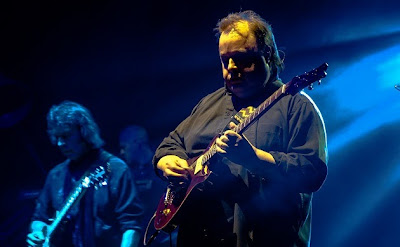 |
| Hackett with Steve Rothery |
Steve Hackett: "I felt that in a way, that with respect to the Genesis canon, the best thing would be to invite people who had been influenced by it. By the time I finished inviting people, what we came up with was almost as if it was a movement by the industry itself, or a certain sector of the industry to honor the early work of Genesis, and to tell people how important it was to them.
"Luckily, the album has sold phenomenally, in droves it keeps selling, and you know, I think in a short while it actually outsold the early efforts by the band. I suspect it's like putting together an army of generals. It's been an amazing effort by a tremendous amount of people.
"I did most of the guitar work myself, but in places, obviously, Roine did the guitar solo on The Return of the Giant Hogweed, and we liked it so much, that kind of spontaneous feel he came up with - he thought that we would do the same thing we've done live together at one point, where we'd swap phrases, but I thought it was so good, I thought, 'He's done that, let him have his say on that!' I had done the tapping on the front and all that kind of stuff, and some police sirens on the end.
"Sometimes, one guitar is enough. With Steve Rothery, we've swapped phrases on The Lamia, on the solo at the end.
"Steven Wilson on Shadow of the Hierophant, he joined in on the end, I actually used his guitar work from the live session he did with us at Shepherd Bush Empire - we flew that in, basically. So, we've got him playing with us, as well!
"That's great, all these guys are pals, and it's been really good. It's been a tremendous effort by a lot of people. It's been doing great, I've been doing shows, and I've been guested by some of the people that appear on the album.
"When we do the Chicago Shows (September 20 & 21), there's going to be Francis Dunnery, and Simon, Phil Collins' son. When we do the Royal Albert Hall in London in October, Bonnie Tyler's going to be onstage with us, which is wonderful and I'm thrilled about that. Various other people will be joining in, like John Wetton."
As I stated at the interview's beginning, Genesis Revisited II won big at Prog Magazine's 2012 year end awards - I asked Steve how it felt to be so validated:
Steve Hackett: "Yeah, it's been an amazing time!
"I always think that it's been a slow burn for me. There were people who came out of the woodwork, like Hendrix, who seemed to arrive on the scene fully formed. But it's taken me decades - where I still wouldn't consider myself fully formed, but it does feel good to finally be getting the recognition.
"But, you know - I always say this to people, that it might take you a long time, but you can't go wrong if you're in love with so many genres of music, and you want to do some sketching first - but, you may finally want to do the full portrait."http://www.hackettsongs.com/tour.html
Steve Hackett on Facebook
Pre-order Genesis Revisited: Live at Hammersmith here

